Political Concept Of Authority – Political Science Notes – For W.B.C.S. Examination.
ক তৃত্ব রাজনৈতিক ধারণা – রাষ্ট্রবিজ্ঞানের নোট – WBCS পরীক্ষা।
Political authority is a distinct form of authority by contrast, for example, with parental or divine authority, in that it is, historically at least, attached to the power of governments and their various extensions (such as the laws, officials, courts, the police etc.). Political authority is also a variety of the larger category of practical authority (which includes parental and divine authority). A practical authority is an authority that gives us reasons for action by contrast with a theoretical authority, such as a knowledgeable friend or an expert, who gives us reasons for beliefs.Continue Reading Political Concept Of Authority – Political Science Notes – For W.B.C.S. Examination.
Power and authority are perhaps the most vital aspects of all organisations in general and political organisations in particular. Power is related to taking of decisions and for the implementation of those decisions. No organisation, whatever may its nature be, can do its duty or achieve objectives without power.
Robert Dahl in many of his works has defined power and analysed its various aspects. In his A Preface to Democratic Theory Dahl calls power a type of relationship in respect of capability and control. Take a very simple example. There are two men—A and B. If A possesses the capability to control B then it will be assumed that A has the power. So power involves a successful attempt to do something which he could not do otherwise.
In any society there are diverse interests and all are alike. When there are conflicts among them one interest proceeds to dominate over the other and the interest which prevails upon the other the former may be called powerful interest.
Karl Deutsch says that power means the ability to be involved in conflict, to resolve it and to remove the obstacles. Though Deutsch defines the concept in the background of international politics, its relevance to national politics is, however, undeniable. In domestic politics or pluralistic societies there are many competing groups and all struggle to capture power or to influence. The group which succeeds finally will be called powerful.
D. D. Raphael (Problems of Political Philosophy) has analysed power from various aspects. He believes that generally power means the ability. Raphael says that in French there is a word “Pouvoir”. In Latin “Potestas” is commonly used. Both these words (these are verbs) mean “to be able”.
Raphael is of opinion that the English word power is derived from these two words and naturally power may be used to mean ability and hence his definition of power is specific kind of ability. Why specific kind? Let us quote him: “The ability to make other people do what one wants them to do”.
Some political scientists want to mean that there is a special type of power which may be designated as political power. For example, Alan Ball feels that power may generally be used in political sense. Hence political power may broadly be defined as the capacity to affect another’s behaviour by some form of sanction. Leslie Lipson (The Great Issues of Politics) thinks that power is nothing but the ability to achieve results through concerted action.
Hague, Harrop and Breslin’s definition is slightly different: “In a broad sense the power is the production of intended effects”. A sociologist’s definition of power is: the possibility of having one’s own decision, select alternatives or reduce complexities for others. Thus, power means the capacity to make decisions binding and ability to discharge responsibilities and perform certain functions.
Nature of Power:
From the definitions of power noted above we can get certain features and the first such feature is it is used in relational sense. When there is only one actor or element the issue of power does not arise. It is because power implies ability to influence or control others or to get things done by others. Naturally power relates to the relationship or interaction between two or among more than two elements or actors. So power is always viewed in the background of relationship.
In the second place, “power is disaggregated and non-cumulative it is shared and bartered by numerous groups spread throughout society and representing diverse interests”. In any pluralist society there are numerous groups and they all compete among themselves at various levels to capture political power or to influence the agencies who exercise their influence.
Hence it is observed that power is not concentrated at any particular centre. Again, all the centres of power do claim to have equal or almost equal amount of power. In other words, there is an unequal distribution of power like an unequal distribution of wealth.
Our own publications are available at our webstore (click here).
For Guidance of WBCS (Exe.) Etc. Preliminary , Main Exam and Interview, Study Mat, Mock Test, Guided by WBCS Gr A Officers , Online and Classroom, Call 9674493673, or mail us at – mailus@wbcsmadeeasy.in
Visit our you tube channel WBCSMadeEasy™ You tube Channel
Please subscribe here to get all future updates on this post/page/category/website



 Toll Free 1800 572 9282
Toll Free 1800 572 9282  mailus@wbcsmadeeasy.in
mailus@wbcsmadeeasy.in


















































































































